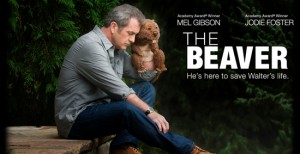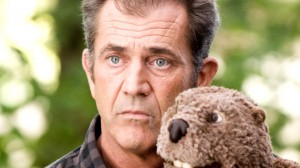Jodie Foster On Mel Gibson and The Movie That Could zoomermag.com Movies PEOPLE Thursday, May 5, 2011 By Richard Crouse
 Stand aside Oprah, Jodie Foster must be the most powerful woman in Hollywood. Possibly in all the world. Not only did she get The Beaver, a difficult script, long thought to be brilliant but unfilmable, to the big screen but then got the movie released in spite of her star, Mel Gibson turning into a public relations nightmare.
Stand aside Oprah, Jodie Foster must be the most powerful woman in Hollywood. Possibly in all the world. Not only did she get The Beaver, a difficult script, long thought to be brilliant but unfilmable, to the big screen but then got the movie released in spite of her star, Mel Gibson turning into a public relations nightmare.
Gibson’s recent notoriety threatened to derail the film—three release dates have come and gone—but Foster fostered on, and the movie, about a depressed man who communicates through a beaver puppet hits theatres this weekend.
In a recent sit down in Toronto I asked Foster if Gibson’s baggage would prevent her from working with him again. The two have been friends since meeting on the set of 1994’s Maverick.
“I would work with Mel Gibson every day of my life if I could,” she said without hesitation. “He is the most beloved and easiest guy I have ever worked with. He is the least neurotic actor I’ve ever worked with and incredibly inspiring to work with.”
She goes on to call him “one of our greatest American directors” and says that whenever she sees him she asks, “Don’t you have a part in your Viking movie for a little blonde girl that’s about five foot three?”
Gibson and Foster came to The Beaver after it had languished on the Hollywood Black List, a compendium of great unproduced scripts that has featured titles like Juno and Lars and the Real Girl. The director – actor combo of Steve Carrell and Jay Roach considered making it but passed the script along to Foster instead.
“I can only imagine it would have been a very different film with them,” she says, “maybe a fantastic movie as well. There’s many ways of treating this story. When I read it I was just so moved by the drama of it. I warned everybody up front, ‘I just want you to know, for me, this is a drama. It needs to be moving and we need to work backwards from there.’
“In some ways we had to curtail a lot of the lighter sides and really pull down the comedy.”
She says several scenes were left on the cutting room floor because they were too funny.
“The great professional challenge of this film was trying to figure out the tone. It is a tone that is all over the place. It is light in the beginning and little by little turns darker and you kind of have to embrace that. It’s also a film that is chatty and witty and has a strong intellectual side and yet it is a very raw and primitive film as well.”
The Beaver is a passion project for Foster who says as a director she can’t work on anything she doesn’t feel in her gut.
“Just as you are well cast for certain roles,” she says, “you’re well cast as a director for certain roles. What a director has to do is wake up at three o’clock in the morning and say, ‘I’ve got an idea!’ I don’t know how you do that in a buddy cop movie about Martians. I don’t have any ideas unless I’m inspired. Unless I have an emotional connection to the material I know my limitations. I know that as a director that’s what I bring to the table. I don’t have any interest in doing a big event release CGI movie. The good news is I don’t really have to because I have another identity as an actor.”
“Well,” I say, stating the obvious to the most powerful woman in the room, “you’re Jodie Foster.”
“Whatever that means,” she laughs.

